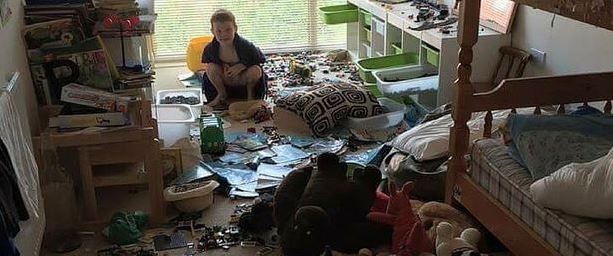I’m thinking of getting rid of most of my kids’ toys. I’m simply tired of the messes.
I thought at first that we just needed to teach our kids more discipline; that in addition to our thorough weekly clean we needed to be more rigid about overseeing morning and evening cleans.
But ain’t nobody got time for that. Besides, that’s ridiculous. Parents need to teach their kids the importance of routine, discipline, and hard work. But if it’s gotten to the point where a parent needs to exercise constant oversight, or constantly look for new and creative ways to store toys, then something else has gone wrong.
And what’s gone wrong is that my kids, and many other kids today, simply have too much stuff. And it’s paralyzing them. When kids have too many things, they forget how to play with them. About the only thing they can do with too many toys is make messes. The disorder causes their play becomes disordered.
Take Legos, for instance. Like many parents, we began buying them sets when they were younger. At this point, they have amassed thousands.
But a strange thing has happened as they’ve gotten older and accumulated ever more Legos: their creativity in building has actually diminished. Many of their inventions show less imagination and complexity than those they created in years past when they were younger and had less Legos. Plus, they don’t seem to enjoy playing with them as much.
On the contrary, they now eagerly look forward to building with Legos at the house of my wife’s friend. She doesn’t have thousands of Legos like us; she has one shoebox of them. But as one of my sons has said, “It’s just enough Legos… we can actually PLAY with them.”
Ouch. Too much stuff.
The paralyzing behavior I’ve mentioned with toys is indicative of that old sin known as sloth, a.k.a. “acedia,” a.k.a. depression. In the Summa Theologiae, Thomas Aquinas defined it as “an oppressive sorrow, which so weighs upon a man’s mind that he wants to do nothing.”
And traditionally, sloth was said to follow upon the heels of another sin—gluttony—which Aquinas defines as “an inordinate desire” for something that “leaves the order of reason.”
As an example of how sloth follows upon gluttony, just think about how you feel after overeating: not exactly energized and ready to tackle life’s challenges.
Many of us have become gluttons with possessions (and in some cases, have helped our kids become gluttons)—and its paralyzing and depressing us.
The notorious show Hoarders displays the extreme cases of an epidemic that is afflicting America. The average American home now has 300,000 things in it, and one in ten Americans has to rent offsite storage for their extra “stuff.” In addition, only 3.1% of the world’s children live in America, but these children own 40% of the toys consumed globally. And cleaning up after this stuff has become an almost full-time job for households. It tells you something when one of the top bestsellers last year was The Life-Changing Magic of Tidying Up.
Being creative, being successful, being happy is in part tied to a certain minimalism when it comes to possessions. As I’ve mentioned elsewhere, the citizens of Ancient Greece during its most creative period lived an extremely simple lifestyle. Today, too, some of the most successful CEOs maintain minimalist patters so as to free up time and energy for their creative pursuits.
There is a fear that dramatic reductions of children’s toys will cause them to be bored. In Laura Ingalls Wilder’s Little House in the Big Woods, her “toys” consisted of a rag doll and a few books. I don’t remember her saying that she was bored. On the contrary, I’ve come to see that it’s an overabundance of toys and possessions that is more likely to make one bored.
I’m tired of possessions possessing my children. I want them to be free to develop and flourish rather than enslaved by messes. I want to give them a more ordered life rather than be frustrated with them for failing to bring order to chaos.
It’s time for the purge.
—
















Leave a Comment
Your email address will not be published. Required fields are marked with *